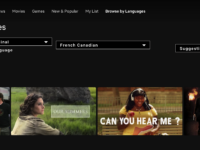I have previously written about Bill C-4, legislation framed as an affordability measures bill, but which also exempts political parties from the application of privacy protections on a retroactive basis dating back to 2000. The provisions give political parties virtually unlimited power to collect, use and disclose personal information with no ability for privacy commissioners to address violations. Minister François Philippe Champagne has avoided mentioning the privacy provisions when discussing the bill and not a single Liberal MP has discussed it during House of Commons debates.
Post Tagged with: "crtc"
Quebec’s Streaming Regulation Bill 109: Unconstitutional, Unnecessary, and Unworkable
The federal government’s plans to regulate internet streaming services such as Netflix and Spotify through the Online Streaming Act have been mired in regulatory battles and court cases for many months. My Globe and Mail op-ed notes that the government’s plans finally took a small step forward last month, as Canada’s broadcast regulator, the Canadian Radio-television and Telecommunications Commission, completed weeks of hearings into what counts as Canadian content, or “Cancon.”
Yet in the midst of the latest hearings, the Quebec government threw a monkey wrench into the entire process. Not content to wait for the CRTC process to play out, the provincial government introduced its own streaming regulation bill that is likely to spark a constitutional challenge. Quebec’s Bill 109 contemplates government intervention into how content is presented to subscribers, and would introduce unprecedented quota requirements that could lead to blocked services in Quebec or the removal of thousands of non-French titles from content libraries.
The Law Bytes Podcast, Episode 234: “Solutions Aren’t Going to be Found Through Nostalgia”: Mark Musselman on the CRTC Hearings on Canadian Content Rules
The CRTC recently wrapped up a two-week hearing on the Online Streaming Act that featured most of the usual suspects, though notably not the large streaming services. The Commission grappled with foundational issues such as modernizing the definition of Canadian content, instituting IP requirements, and introducing new discoverability rules into Canada’s broadcasting regulatory framework.
Mark Musselman is a former entertainment lawyer, longtime Canadian movie producer, current PhD student focused on cultural and legal policy, and the author of the White Paper Black Coffee substack. Having appeared many times before the CRTC, he joins the Law Bytes podcast to discuss the recent Cancon hearing, breaking down the major issues of debate and identifying what was missing from the discussion.
The Law Bytes Podcast, Episode 220: Marina Pavlović on the CRTC’s Plans to Address Consumer Frustration Over Wireless Contracts
Consumer frustration with just about everything associated with Canadian communications services is well known. The list of concerns is long: high prices, contracts that lock in consumers but not providers, gaming prices to make comparison shopping difficult, and confusing consumer codes among them. As politicians have begun to take notice, the CRTC has suddenly become more active with several consultations and new consumer focused initiatives. My colleague Marina Pavlović, a law professor at the University of Ottawa, has been at the forefront of consumer rights law and communications services for many years. She joins the Law Bytes podcast to talk about the ongoing consumer challenges and the latest CRTC developments.
How the Online Streaming Act Misdiagnosed Canada’s Broadcasting Woes
Nearly one year ago, I made my way from my home in Ottawa across the river to the Gatineau hearing room used by the Canadian Radio-television and Telecommunications Commission (CRTC) to participate in its inaugural proceeding on implementing the Online Streaming Act, better known as Bill C-11. I had regularly appeared as a witness at House of Commons and Senate committees, but this was my first time participating in a hearing before Canada’s broadcasting regulator. I came with a simple message: while the roster of witnesses was filled with cultural lobby groups and broadcasters asking for their share of the bill’s anticipated pot of gold, the perspective of consumers and the public interest needed to be heard.
My opening statement emphasized prioritizing public over private interests, which, I argued, meant putting Canadians at the centre of their communications system, as one CRTC chair once characterized it. I did not anticipate receiving a warm reception, but I was still taken aback by the frostiness toward the notion that consumers and the public interest were important considerations. Instead, commissioners pointed to the need to step in where broadcasters or content creators were struggling to succeed in the market.











